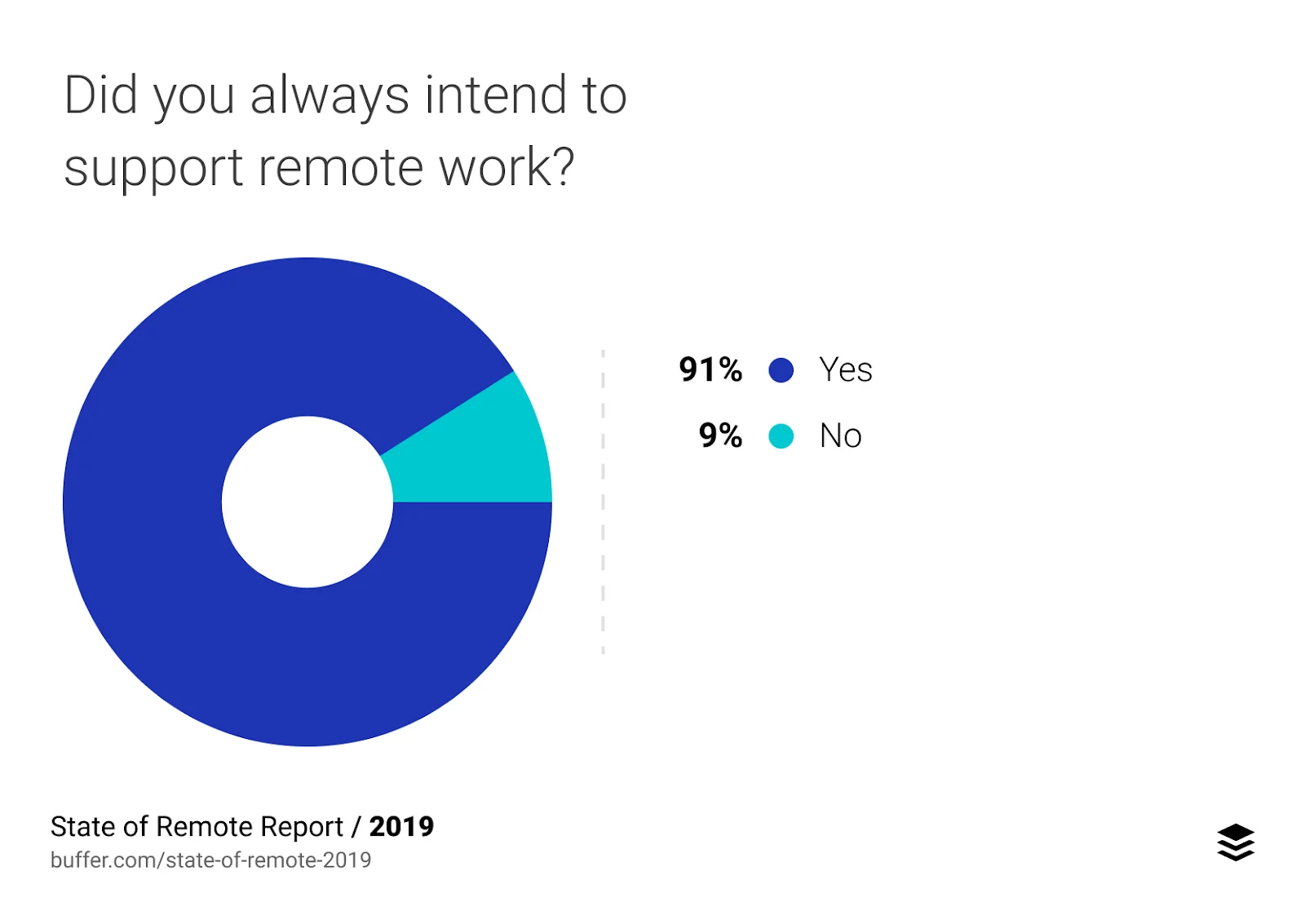2020 was the year it all changed. The metro stations echoed with emptiness, the city centre sandwich shops were adrift. Previously busy streets packed with commuters were now wide open and everyone was working from home.
Nobody expected 2020 to be a year defined by pandemic but, even now as a vaccine is rolled out and things are beginning to return to normal, some things can’t go back to the way they were. More people than ever are seeing the benefits of remote work and whether that’s a converted bedroom-turned-office or a South Asian beach, people are thinking about making remote work permanent.
But remote work isn’t always paradise – like any job it has its perks, and its problems. Let’s take a look at everything you need to know about remote work before you make the big decisions.
The State Of Remote Work
Even before a global pandemic changed our working habits for ever, remote working was growing in popularity. In the previous decade, the number of people involved in remote working grew by almost 160%. In the United States even pre-crisis, remote work featured in almost one in twenty workers’ lives.
“Our world is increasingly interconnected, making it easier than ever for individuals to work outside of the office and still contribute to a company,” says Erlene Edmonson, a freelance editor at State Of Writing and Writing Services. “Freelancers and consultants form a larger share of the workforce and organizations are increasingly outsourcing roles.” Despite this, there remains some cultural resistance to remote work: employers are worried about productivity, a lack of oversight and cultural damage that can take place without a thriving office.
These problems are rapidly being solved by platforms such as RemoteTeam which provide organizations with the tools to seamlessly manage a remote workforce without any loss of productivity. With fewer barriers than ever we’ll see more opportunities than ever for remote working in the future.

Key takeaway: The world of remote work is in rude health. As technology mitigates the disadvantages, organizations are discovering the benefits of remote work creating more opportunities for you to go remote full time.
The Big Considerations Before Moving To Remote Working
Remote working offers workers more control over their working environment. However, stepping away from the office comes with a range of downsides. Let’s consider the myths of remote working – and the reality.
Managing Your Schedule
One of the main reasons that people pursue remote working is to take back control of their schedule. For the average working American, the commute takes almost 30 minutes each way. Cutting this out of your routine provides an opportunity for focusing on your wellbeing – with mornings free for yoga workouts and home cooked dinners every evening.
Before going remote, however, it’s important to consider what you’ll do with this time. Without an established routine, it can be hard for remote workers to switch on in the mornings.
Key takeaway: More flexibility in your schedule can lead to a lack of motivation. Remote workers need to plan their routines and build new habits which promote a working life.
Finding The Space
When you move out of the office and into a remote working lifestyle, the world becomes your office. That kind of freedom sounds great, but it’s important for remote workers to consider how and where they’re going to be working – which space will work to replace the office for you?
For the majority of workers – around 84% – remote working means working from home. “Finding the right space to work is essential to your motivation and productivity,” says Gerald Hofer, a writer at Revieweal and Ukservicesreviews. “Your studio apartment may not be conducive to a home office.” Discovering coworking spaces or the library (if you can face the college flashbacks) might be essential to your remote working career.

Key takeaway: Remote working means letting go off the office, which could have unexpected side effects on motivation and productivity. Before you go remote, explore your options for home offices and co-working spaces.
Switching It Off
Whilst many people pursue remote working because of a drive to build a balanced life, quite the opposite can occur. When you break the connection between working and the office, the boundaries between work and life become broken down. Remote workers who choose to work at home can find their working day lengthening as toast is munched for breakfast at your desk.
40% of remote workers report having a hard time unplugging at the end of the day. Anyone considering going remote on a permanent basis needs to be aware of the dangers this can pose to your work-life balance and your overall well being. Finding ways to resolve this is an essential part of moving to remote working.
Key takeaway: Remote working can’t wave a magic wand on your work-life balance. It presents new challenges for unplugging and these need to be considered before transitioning from office-based roles.
Cultivate The Skills
Whatever your role, you’ll have spent years acquiring the skills you need to perform your job to a high degree of professionalism. However, when people turn to remote working, they sometimes discover that removing the office environment leaves them lacking certain qualities they’d never noticed they needed.
When you’re working remotely you need to be able to problem-solve on your feet as you don’t have a team to draw from, at least not physically. If you’re encountering computer problems, there’s no IT guy to save the day. Further, developing as a communicator is essential – although communicating online is easier than ever, communicating well in the absence of body language and physical cues takes work.
Key takeaway: Remote working requires skills you might not have always drawn on on the office environment. Build your communication and problems-solving skills to thrive as a remote worker.
Managing Productivity
When there’s no boss looking over your shoulder it becomes all too easy to let concentration slide. For many people, their productivity is surprisingly reliant on their environment – when you shift to remote working, whether you’re in your kitchen or co-working, you need to build up new habits around motivation, productivity and time-management.
Fortunately, there are many apps that can help you manage time and discover productive spells when you’re remote working. By locking yourself out of distracting websites or simply changing your interface, you can find new levels of productivity when you’re remote working.
Key takeaway: Productivity doesn’t always come easy when you’re remote working. Take advantage of apps and systems to help replace office motivation.

The Challenges Of Networking
Discovering new careers opportunities through face-to-face interactions has been a feature of business since the Ancient Egyptian times (probably). New jobs can be discovered on LinkedIn or social media, but a tap on the shoulder for the perfect role always helps.
When you begin remote working, some of these opportunities fall by the wayside so you need to step up your game. Replace them with digital connections through LinkedIn groups or by pursuing real-time contact at conferences.
Key takeaway: Out of the office it’s easy to feel cut out of the essential business networks that make career progression possible. But networking doesn’t have to end altogether, just shift into the digital realm.
Conclusion
As remote work hits the mainstream, more organizations are open to transitioning traditional roles into those filled remotely. For many, this might present opportunities to enter a new phase of your career without even changing jobs. If you’re considering remote work as an option for your future you need to explore the change of culture objectively. Remote work isn’t all about sitting on the beach sipping margaritas – becoming a remote worker presents its own challenges of motivation and communication. Nevertheless, the opportunity for a better balance is out there.
FAQ
What does it mean to work remotely?
Remote working means working through digital connections outside of the office environment. Breaking with tradition, remote working allows workers to connect from anywhere.
What are the benefits of remote working?
For employees, remote working provides many with a feeling of freedom and the ability to build a better balance in their working and personal lives. For employers, remote working enables reduced costs of infrastructure and greater employee retention.
Are remote jobs worth it?
Whether a remote job is right for you depends on your character – some thrive in a home office whereas others struggle in the absence of office culture. If you’re exploring non-traditional ways of work, remote working is certainly something to consider.
What skills do you need to work remotely?
A sense of independence and the ability to motivate yourself are essential character traits for remote workers. As for career, many jobs can become remote thanks to the digital tools of today. Programmers, graphic designers, creatives and even administrators can all explore remote work.
Author: Katherine Rundell
Katherine Rundell is a freelance writer at Essayroo and Bigassignements. She’s fueled by travel and coffee and is currently living in New Jersey. She is also a proofreader at Best Essay Writing Services.




